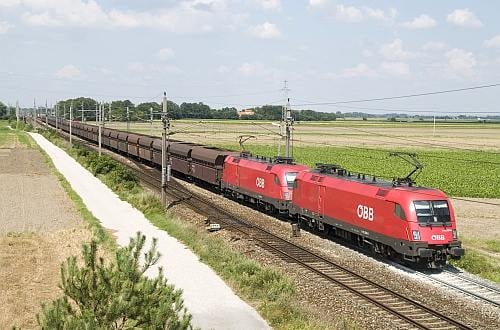Ebit reached €755m, compared with €701m in 2012. Total revenue rose slightly from €6.22bn to €6.25bn, while expenditure dropped from €5.52bn to €5.49bn. The final consolidated result reached €103m, up from €75m the previous year, with all three subsidiaries contributing to the improved results.
Rail Cargo Austria contributed an Ebit of €58.4m, compared with €31m in 2012, even though revenues fell from €2.34bn to €2.28bn. This is the result of further restructuring of market segments served by the operator. Freight volumes in Austria dropped from 87.7 million tonnes to 83.4 million tonnes, although Rail Cargo Hungaria and Rail Cargo Italia carried similar volumes to 2012. In total Rail Cargo Group carried 109.3 million tonnes in 2013, down from 113 million tonnes in 2012.
ÖBB Passenger Transport reported another increase in passenger figures, which rose 4% from 224 million to 234 million. This increase is largely attributed to greater demand for local and regional train services, with long-distance passenger figures remaining stable. This is interesting as the effects of the new Vienna – St Pölten high-speed line, should have led to an increase in long-distance passenger traffic.
However, this increase seems to have been absorbed by new entrant Westbahn which stepped up its Vienna – Salzburg open-access service last year, increasing train-km by 20%. ÖBB admitted that their Vienna – Salzburg IC trains suffered from a significant decrease in passengers whilst Railjet usage increased slightly. Nevertheless, total revenue rose from €1.87m to €1.93m whilst EBIT dropped from €75.9m to €74.9m.
ÖBB Infrastructure reported a slight increase traffic on the network, which increased from 142.0 to 142.8 million train-km. Whilst passenger traffic rose from 94.9 million to 95.6 million train-km, freight dropped from 40 million to 39.7 million train-km. ÖBB Infrastructure's EBIT rose from €594m to €606m.
ÖBB announced that the consolidation process has now been concluded and that a period of growth is expected. However, Rail Cargo Austria anticipates increasing competition and hopes to keep its Austrian market share stable whilst increasing revenue by focussing on international services between Germany and the Balkans.

